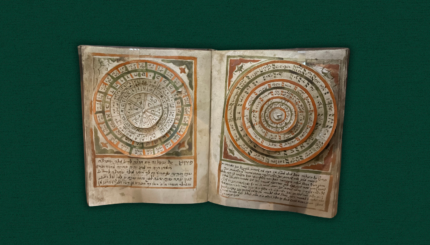This article is written from a traditional perspective. This article is excerpted with permission from The Encyclopedia of Jewish Prayer (Copyright 1996 Jason Aronson, Inc.)
Attah Hareita is a prayer named after its introductory verse (Deuteronomy 4:35), comprising a collection of other biblical verses, each in praise of God and the Torah. These verses are recited on the Sabbath and festivals by some Sephardic rites and by congregations following Hasidic ritual, to mark the beginning of the ceremony of taking the Torah from the ark, and by the Ashkenazic rite on Simchat Torah to introduce the Hakafot [Torah procession] ceremony.
The reason the six verses Attah Hareita, Ayn Kamokha, Malkhutekha, Hashem Melekh, Hashem Oz, and Haytivah Virtzonekha are said before opening the ark is because of the verse, “And when they that bore the ark of the Lord had gone six paces, he [David] sacrificed an ox and a fatling.”
The biblical commentator Rashi comments on the verse Attah Hareita Lada’at (“Unto thee [Israel] it was shown to know”) that “when the Holy One Blessed be He gave the Torah, He opened for them the seven heavens, and just as He split the upper, so He split the lower [regions], and they saw that He is one; therefore it is stated Attah Hareita Lada’at.“The opening verse is therefore appropriate for Shabbat, considering that the Torah was given on Shabbat [according to traditional belief].
With your help, My Jewish Learning can provide endless opportunities for learning, connection and discovery.
According to tradition, it became customary to recite Attah Hareita in a standing position at the evening service of Shemini Atzeret (if the ceremony of Hakafot takes place) and also at the evening and morning services of Simchat Torah. Each verse is read by the Shaliach Tzibbur [service leader]and repeated by the congregation. At the verse Ki mitziyon, [For our of Zion] all the Torahs are removed from the ark. Most congregations, however, remove the scrolls after all the verses have been recited. The custom also exists that each verse is read by a different member of the congregation and then repeated by the congregation. The ark is opened at Vayehi bineso’a [when the ark was carried].
Generally the first verse, Attah Hareita, is recited by the rabbi of the congregation and the verse Kohanekha yilbeshu tzedek [“your priests will be clothed in righteousness”]by a Kohen.
ark
Pronounced: ark, Origin: English, the place in the synagogue where the Torah scrolls are stored, also known as the aron kodesh, or holy cabinet.
Hasidic
Pronounced: khah-SID-ik, Origin: Hebrew, a stream within ultra-Orthodox Judaism that grew out of an 18th-century mystical revival movement.
Sephardic
Pronounced: seh-FAR-dik, Origin: Hebrew, describing Jews descending from the Jews of Spain.
Shabbat
Pronounced: shuh-BAHT or shah-BAHT, Origin: Hebrew, the Sabbath, from sundown Friday to sundown Saturday.
Torah
Pronunced: TORE-uh, Origin: Hebrew, the Five Books of Moses.


